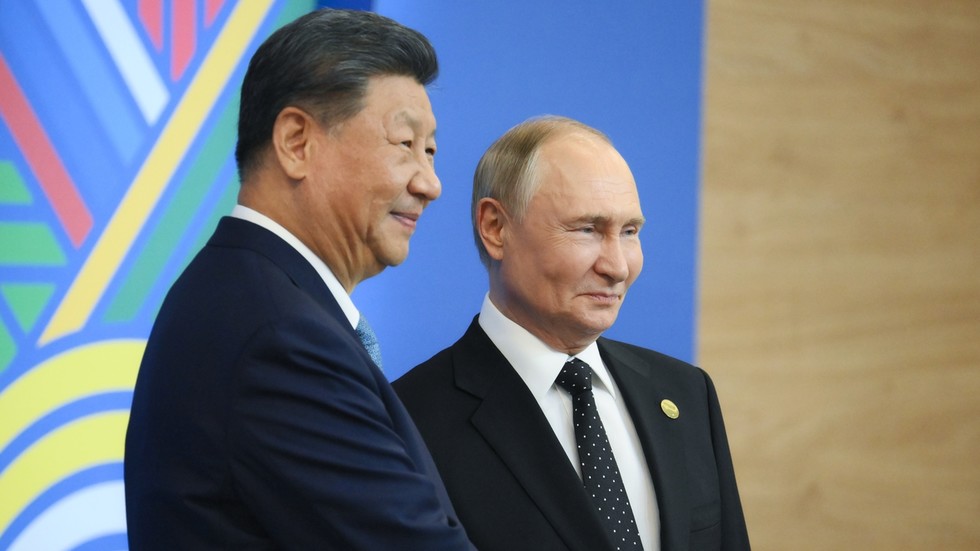Some in Washington see Moscow as a “junior partner” to be drawn away from Beijing’s orbit and into its own
It’s just projection as usual from the west.
Western experts often speak about Russia becoming China’s ‘junior partner’ and even a ‘vassal state’. This narrative has dominated nearly all Western discussions about Russia-China relations for a long time.
[…]
Another popular argument in favor of this theory is the difference in the size of the population and economy of the two countries (China’s population is ten times larger than that of Russia, and the same goes for its economy). While this is true in terms of statistics, reducing the complexities of interstate relations to mere statistics is either foolish or a deliberate oversimplification. Firstly, Russia maintains a decisive advantage in other areas, such as military-strategic potential
[…]
US President Donald Trump’s recent attempts to normalize relations with Moscow are interpreted as an effort to replicate the ‘Nixon effect’, but in reverse. In the early 1970s, then-President Richard Nixon’s visit to China strengthened US-China relations amid their shared opposition to the Soviet Union. Now, it is believed that American diplomacy could lure Russia away from China, enabling the US to deliver a strategic blow to China.
However, this comparison does not stand up to scrutiny. Firstly, during the 1970s, China and the USSR were already in a state of confrontation; Nixon’s actions didn’t cause this confrontation, but he capitalized on the favorable circumstances to open up the Chinese market for America and gain leverage in the struggle against the USSR. Today, neither Russia nor China wants to distance themselves from the US. If anyone is to blame for their closer alliance, it’s America itself – which has labeled them ‘existential adversaries’ and, out of arrogance and miscalculation, initiated a policy of ‘dual containment’.
Within this framework of dual containment, the US sees China as a far more dangerous rival and Russia as merely an ‘appendage’ that will align with either the US or China in the struggle for global dominance. However, this isn’t true; this perspective exists solely in the minds of the American elite.
[…]
The Chinese perspective
China sees the escalating tensions in the world and does not want to get involved in a bipolar confrontation – at least, that is China’s official stance. China considers America’s increasing obsession with containing it the result of “a Cold War mentality” and wonders why a profitable economic partnership, which has benefited both nations, should be jeopardized.
Unlike American politicians who believe that China might replace the US as the global leader, the Chinese have a more modest assessment of their own capabilities. They see the struggle for supremacy that unfolded between the Soviet Union and the United States as a cautionary tale. The USSR poured vast resources into this rivalry which, as many Chinese experts note, ultimately exhausted the nation, leading to a deep crisis and the collapse of the USSR.
China is determined not to repeat the USSR’s mistakes. Socio-economic development remains its top priority; foreign policy is considered a tool for advancing this development, but not an end in itself. China believes that expanding economic ties and increasing the significance of former colonies and semi-colonies will inevitably diminish the influence of former colonial powers, particularly the US.


There’s no way for the us to give Europe to Russia in any meaningful way. Russia cannot militarily invade and defend that much territory. Russia cannot destroy the meager production of Europe and become it’s dominant producer of commodities. At best, Russia could create free trade agreements that lock the European economy into dependence on Russia, but it doesn’t really need an alliance with the USA to do that and it can’t get any guarantees from the USA that will ensure continued trade dominance.
I don’t think the USA has anything it can give to Russia. It can only agree to not take, which requires a level of trust the USA has eroded entirely.
Economically. More-over neutralizing them, leaving them vulnerable so they have to abandon the hawkish Russia hating rhetoric and resume trade and acting reasonably including cultural exchange and assumedly the ability for the Russian bourgeoisie to live in and enjoy their wealth in Europe again.
More than that, pro-Russian, reactionary parties are gaining ground in Europe, displacing the set up to fail liberal fanatics that the US has left in a real bind over Ukraine. The US could stop this, could alter European election outcomes, or they could do what Musk and Trump are doing which is attacking European liberals and demanding the open reactionary parties not be suppressed. That would be a positive for Moscow.
Economically is so abstract that it’s reversible. This is why I said the USA can’t give it. What’s it gonna do, promise to not sanction people? Promise not to bomb centers of production? Promise not to build competition? None of these things are things that the US can “give” as a thing that would cause Russia to break its relationship with China.
Those reactionary parties are in Europe are not Pro-Russian in the sense that Russia would benefit enough to end a relationship with China. Those reactionary parties share a history with the EuroFascists that invaded Russia and killed millions.
These things you have just said demonstrate that the US has nothing it can give to Russia to convince it to join the Empire.